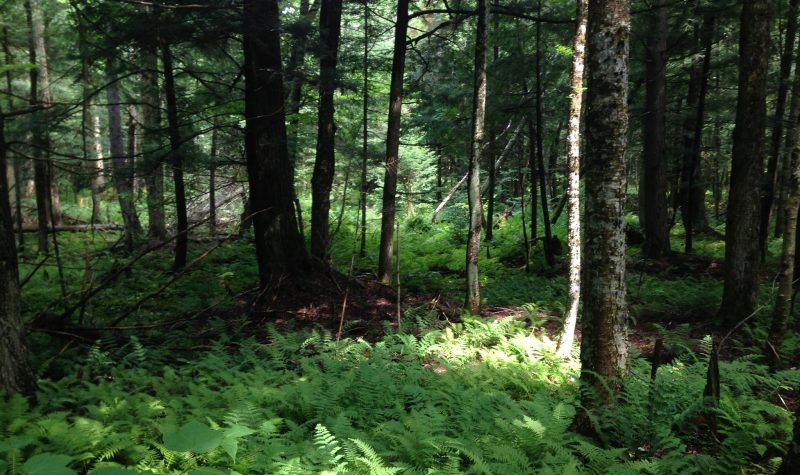Conservation organizations and environmental experts are working on developing the concept of ‘eco-citizenship’ and putting the environment at the forefront of educational initiatives here in the Eastern Townships in the face of a global climate crisis.
Isabelle Grégoire, head of educational programs, operations coordination, and environmental sciences and eco-citizenship for the Mount Pinnacle Land Trust, has been coordinating, creating, and teaching environmental science programs for primary schools, secondary schools, and collegial institutions for the past 25 years. More recently, she has also been working with other environmental groups, conservation organizations, MRCs, and municipalities.
“I think, right now, the situation is so obvious. There are so many people that are anxious as to what is happening. The climate issues are obvious now, there’s no way to say that it’s not happening,” said Grégoire. “But I think now it’s not just a question of educating future biologists or geographers. It’s a question of educating everyone, the citizens. People want to know and they want to do their little part. It’s the time, now, to talk about eco-citizenship and not just citizenship.”
For Grégoire, citizenship means “the respect of people, the respect of communities, cultures, and history,” but what’s missing is “the respect of nature.”
“What about the respect of nature? Everything we have comes from trees, clean water, land, and fertile soils, all we have comes from nature. It sounds obvious, but it’s about time to realize it on our own, everyone in our territory. It’s not just the responsibility of ‘tree lovers,’ it’s the responsibility of everyone,” she emphasized. “This is an urgent need for everyone to look at the nature around us and the concerned forests, lands, and landscapes.”
Working to develop the concept of eco-citizenship, Grégoire said that her teachings focus on introducing people to the history of the territory rather than trying to change their behaviours, which she says will come naturally.
“The first thing to know is, before being used by humans, what was my land? Where do we live? What are the mountains? How does it exist? Has the soil always been there? What kind of trees? How was the forest 100 years ago? We got to have more interest for history, but the real history, not just our colonialist background,” she explained. “(…) This is what I’m teaching for the general public or for students.”
Providing some examples of the types of programs she organizes, Grégoire highlighted that she has been working in collaboration with École-o-village for 15 years to conduct scientific activities outdoors next to St. Francis of Assisi primary school in Frelighsburg where an arboretum has been created.
“We’ve had a unique collection of trees, an arboretum, with 50 different varieties of indigenous trees representing the bio-region from the south to northern Quebec, from the temperate forest to the boreal forest. I think I will also mention programs that I do with the Pinnacle Land Trust for sensitive plants. So at the Pinnacle Land Trust we have an educational site, it’s almost four kilometres of trails in a wild, amazing, magical forest protected by this group for 25 years now,” she mentioned. “We bring about 500 students from Massey-Vanier, Sutton, Cowansville, from the whole area, and we are studying. We’re monitoring the general health of the forest, the evolution, and we are looking to take data if there are any invasive species coming in."
Echoing the statements of other conservation groups like Appalachian Corridor, Grégoire noted that the Eastern Townships is a “special place” that is lucky to still have “pristine lands protected in perpetuity,” making it that much more important to provide students and the general public with educational opportunities that prioritize preserving and protecting nature and that can encourage them to play their part.
“I think we have a responsibility to protect what’s left. We have a responsibility not just for wildlife, not just for us, but the general climate quality. I’m lucky, 20 years ago, to have met people from the Pinnacle Land Trust, the Ruiter Valley Land Trust, my collaborators like École-o-village, all groups that have education in their mission. They want to go in schools and teach kids, [have students in action]. (…) Now, I think we have more than 15,000 acres of protected natural areas on private land, which is the second biggest, I would stay, ecological corridor protected in perpetuity in Canada. The first would be in the west, the Rockies, and the second would be here.”
Those looking to have more information on eco-citizenship and the types of educational programs that are running in the area, Grégoire will be presenting a conference at the fourth edition of this year’s Festi’Bois event in Frelighsburg. Grégoire hopes that by having the chance to speak to the public that she will be able to provide tools or ideas as to how people can become engaged in their communities.
“People just need guidelines to do something because they are willing to do something and they are ready as well. So I’m hoping to give tools, reflection, courage, dreams, and vision. The ecological transition is happening, we just need to alight it more and more. From my glasses, the change is happening. I’m working in the transition, we’re going there, we’re almost there,” she said.
Listen to the full interview with Grégoire below:


